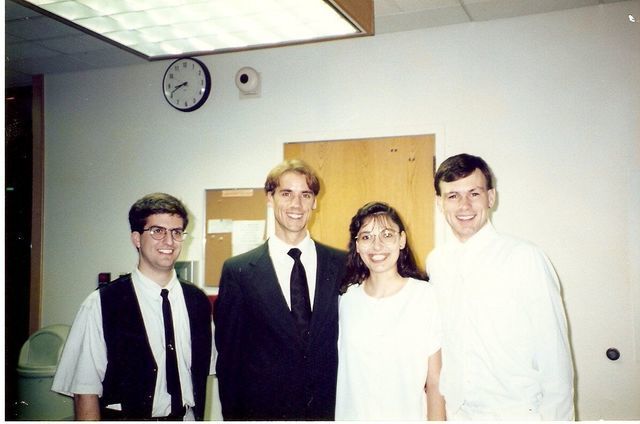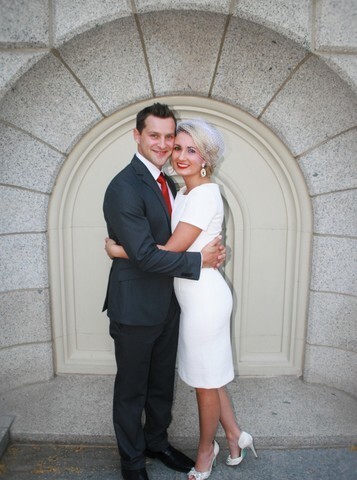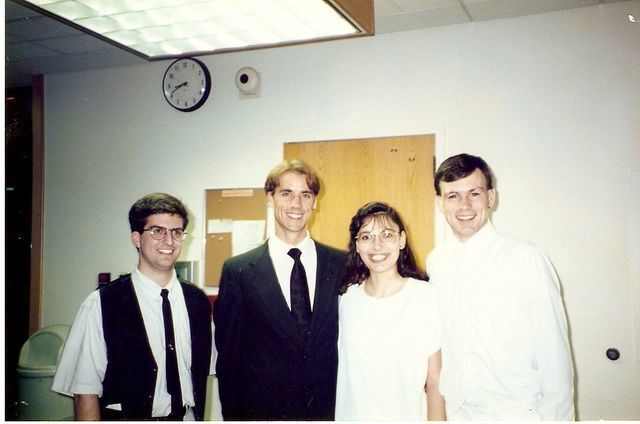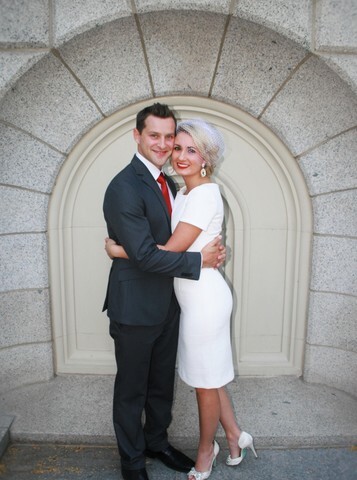Sahar Qumsiyeh grew up in Palestine. Brigitte Robinson grew up in Madison, Florida. Two women, completely different backgrounds and life experiences. Qumsiyeh has dark hair and Robinson has blonde hair. One grew up in the Bible Belt and the other grew up in an area of the world that felt unsafe due to political upheaval. The two women have never met but they share one thing in common: The twice-yearly general conference of The Church of Jesus Christ of Latter-day Saints played a pivotal role in their conversion.
A Palestinian
Sahar Qumsiyeh was raised a Christian on the same streets Jesus walked but her life was void of the peace a belief in Christ is said to bring. Instead, violence was a part of her life for decades. The devastating scenes she witnessed on a daily basis as the turmoil in her country increased were so disheartening that Qumsiyeh contemplated killing herself.
“I was so depressed living in Palestine,” she says. “I had no purpose. I couldn’t understand the purpose of life. I thought God hated me and I was just miserable. My world was dark and gloomy.”
But that began to shift in 1994 when Qumsiyeh arrived in Provo, Utah, as a Masters student at Brigham Young University. She was there as the result of a prompting she didn’t understand. She had every intention of attending American University in Washington D.C. but a strong feeling that she should attend BYU led Qumsiyeh to change course and forfeit $46,000 in scholarship money. At BYU, Qumsiyeh found that her friends believed there was a living prophet on earth and when general conference rolled around, she joined them in watching simply out of curiosity.
“I actually even called my parents, I was shocked that the Mormons think there is a living prophet, like ‘These people are weird,'" she says. "But out of curiosity, I wanted to see what this prophet looks like.”
But during one of the talks that April 1995 general conference, President Gordon B. Hinckley said, “Jesus is the Christ, the promised Messiah, who came to earth in the most humble of circumstances, who walked the dusty roads of Palestine teaching and healing, who died upon Golgotha’s cruel cross and was resurrected the third day.”
This may not seem incredibly momentous but for the young woman from Palestine, it was life-changing.
“My country of Palestine is occupied by Israel and a lot of people really don’t know that but to me, most Americans call it ‘Israel’ and having a leader in this church stand up and refer to it as Palestine just meant something to me,” she recalls.
That one word marked the beginning of Qumsiyeh’s investigation of the restored gospel, truths that have blessed her life in the 23 years since that day. The gospel gave Qumsiyeh an identity that required no documentation and was not dependent on the results of violence.

“If someone asks me what my nationality is, I don’t have one. I can’t say I’m Palestinians because there’s not country called Palestine anymore. It just got occupied by Israel and ceased to exist. And that identity is sometimes important for someone, you want to know that you belong,” Qumsiyeh explains. “You want to know who you are and when I learned about the gospel and my identity as a daughter of God, it just made a huge difference in my life. …”I could say, ‘I’m a daughter of God’ and I had an identity as His daughter and He loved and cared about me.”
Today, Qumsiyeh teaches mathematics at BYU-Idaho.
A Floridian
Brigitte Robinson was raised a Southern Baptist who attended church each Sunday with her grandmother. Together, they rarely missed a Sunday. When Robinson was 15-years-old, she began dating Matt Robinson, a member of The Church of Jesus Christ of Latter-day Saints. Dating a Latter-day Saint in “The Bible Belt” was not a popular choice for the teenage girl. In fact, the church she grew up attending actively preached against “The Mormons.”

Robinson waited for her missionary and upon his return home, the couple was married on June 7, 2014.
Approximately, 60 people attend the Latter-day Saint congregation each Sunday in the small rural community of Madison, Florida. One set of missionaries is assigned to the area and over the course of her marriage, she has met all of them.
“They’d meet me and then immediately just offer me a Book of Mormon,” she said.
But then two sisters were transferred into her ward and Robinson gravitated toward their relaxed nature. The sisters never asked if she wanted a Book of Mormon or if she wanted to take the missionary lessons but they frequently had dinner with Robinson. She was able to come to know them on a very personal level and in the process, she began to make changes in her life.
“I slowly started converting without even knowing it. I stopped drinking sweet tea and I stopped drinking coffee, which are huge down here,” Robinson recalled, adding that she also caught herself watching Mormon Messages in her spare time and crying. Still, she told no one, until she told God.
She asked Heavenly Father if the Church was true.
“You hear about people all the time that get like a burning in their bosom and they just know,” Robinson said. “It was like absolutely nothing. ...I think Heavenly Father knows I’m one of the stubborn people where you’re going to have to put it in front of my face because I think if He had put that burning in my chest, I would’ve ignored it.”
Since marrying her husband, Brigitte Robinson has always watched general conference with her husband’s family so it was nothing out of the ordinary when she sat down to watch the Sunday afternoon session of the October 2014 conference until Elder David A. Bednar began his talk.
“My message is directed specifically to individuals who are not members of The Church of Jesus Christ of Latter-day Saints,” Elder Bednar said capturing Robinson’s attention. “How many other non-members are watching this right now?” she asked herself.
The sister missionaries were there watching with the Robinson family and when Robinson returned to her car she found two letters on her car. One was from one of the sister missionaries but the other was from that missionary’s mother. The letters had been prepared without any knowledge of what Elder Bednar would speak about in the last session of conference.
“Heavenly Father was like, ‘I’m going to make sure you’re going to listen,’” Robinson recalled laughing.
A couple of days later, Robinson told the missionaries she wanted to be baptized and they taught her all of the missionary lessons in one night without her husband having any idea. But on a trip to Orlando, she asked him, “Hey so what are you doing this weekend?” He was confused and told her he didn’t have any plans and she replied, “OK, well I’m going to be baptized next weekend.”
“You’d think it would be like this big, magical moment but he looked at me and said, ‘Quit lying.’” But she wasn’t lying. The next weekend, Matt Robinson baptized his wife and his father confirmed her. They were sealed for time and eternity on their 2-year wedding anniversary, June 7, 2016, in the Salt Lake Temple.
Like Qumsiyeh, Robinson says the gospel has helped her better understand her identity as a child of God.
“The gospel showed me...that I had a purpose in this life and that I chose to come to earth and be a part of something so much more than what I thought existed,” she said. “It has made me gain confidence in myself (that) when things get tough, I can turn to my Heavenly Father and the scriptures for guidance.”
Look for Sahar Qumsiyeh’s story in its entirety in her book, Peace for a Palestinian.





